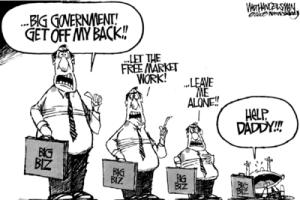- MENU
- HOME
- SEARCH
- WORLD
- MAIN
- AFRICA
- ASIA
- BALKANS
- EUROPE
- LATIN AMERICA
- MIDDLE EAST
- United Kingdom
- United States
- Argentina
- Australia
- Austria
- Benelux
- Brazil
- Canada
- China
- France
- Germany
- Greece
- Hungary
- India
- Indonesia
- Ireland
- Israel
- Italy
- Japan
- Korea
- Mexico
- New Zealand
- Pakistan
- Philippines
- Poland
- Russia
- South Africa
- Spain
- Taiwan
- Turkey
- USA
- BUSINESS
- WEALTH
- STOCKS
- TECH
- HEALTH
- LIFESTYLE
- ENTERTAINMENT
- SPORTS
- RSS
- iHaveNet.com
by Matthew Bandyk

Geoff Colvin, writing about the major tax increases of the Obama administration, lays out one that might have you scratching your head:
That's Obama's first proposed business tax increase.
Another would require companies to account for their inventories on a first-in-first-out (FIFO) basis rather than a last-in-first-out (LIFO) one -- an eye-glazing change that's highly significant.
In an era of rising costs, to assume that you're selling your oldest inventory rather than your newest increases reported profits and thus taxes, even though nothing real has changed. If inflation turns worse, as many analysts predict, FIFO would force companies to pay real taxes on phantom profits as the value of goods gets inflated while they sit in inventory.
I wrote a piece on the LIFO issue a while back. It's a pretty dry issue, but it's becoming more important.
The basic deal is that the majority of businesses use a first-in-first-out accounting method for tax purposes. So when you, a business owner, record the cost of a good you sold from your inventory, it is assumed that the first good added to your inventory was the one sold.
That's great for you if you're selling goods that depreciate in value over time. In that case, what's going on your books for that tax year are your highest cost goods. That means that, for tax purposes, your profit margins look lower on the books, and your taxes are lower as a result.
But what if the value of your goods increases over time -- due to, say, inflation?
Then your profit margins would be higher on your taxes (even though you're not making any more money) and you pay higher taxes. What would be better for you is if you used the alternate LIFO -- last-in-first-out -- accounting method.
Under that method, the goods you sell are assumed for accounting purposes to be the ones most recently added to your inventory -- in an inflationary world, the lower-cost goods.
LIFO became more popular in the high-inflation 70s, and as I discuss in my article, there is greater interest among business owners today as deflation fears wane and inflation fears grow.
Ok, that's a really long and boring explanation of a complicated subject that usually only your CPA cares about. But it's important to show how boring it is -- that's exactly why it might be an easy way to increase taxes.
Most Americans won't complain about getting rid of LIFO because hardly anyone knows -- or cares to know -- what it is.
So why would Obama want to prevent businesses from choosing LIFO if it's what they prefer?
Well, there have been pushes by members of Congress, mostly Democrats, in recent years to ban LIFO. Part of the reason is because they think they can squeeze more revenue out of businesses. Normally, tax increases on businesses are unpopular, but it's hard to even explain the basics of the LIFO-FIFO issue, much less organize a tax revolt around it.
But an equally large reason they support banning LIFO is because that's what much of the rest of the world wants. The International Accounting Standards Board wants FIFO to be the only "official" accounting method around the world. It's already banned in Europe.
But it seems like this is a perfect example of why federalism -- instead of uniform, global standards -- is necessary with a tricky, fickle thing like inflation. We don't need to follow Europe and ban LIFO if it helps our businesses.
As for the tax revenue issue -- this seems like a very non-transparent way to boost the government coffers.
© U.S. News & World Report
WORLD | AFRICA | ASIA | EUROPE | LATIN AMERICA | MIDDLE EAST | UNITED STATES | ECONOMICS | EDUCATION | ENVIRONMENT | FOREIGN POLICY | POLITICS
Obama's Hidden Business Tax Increase
Business Industry & Business News. Business Articles & Industry Current Events